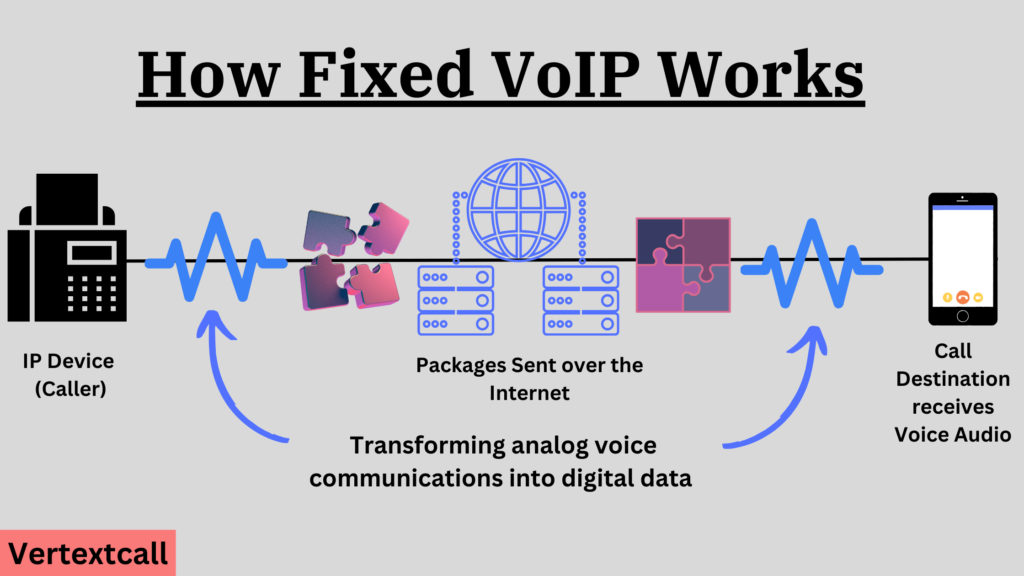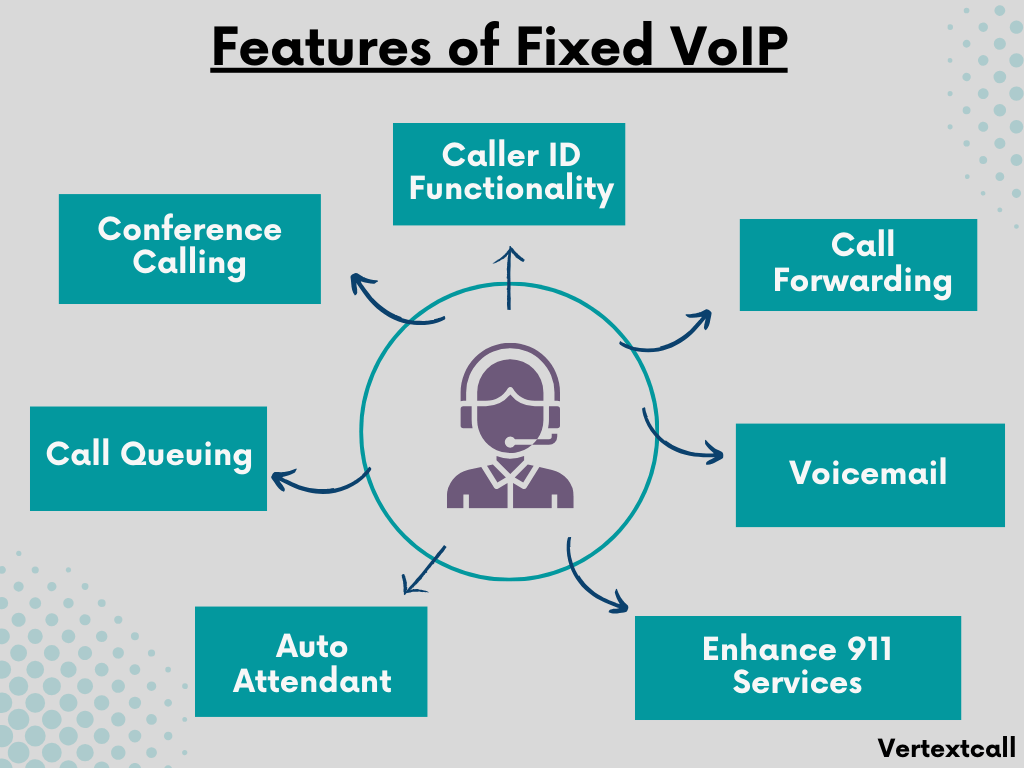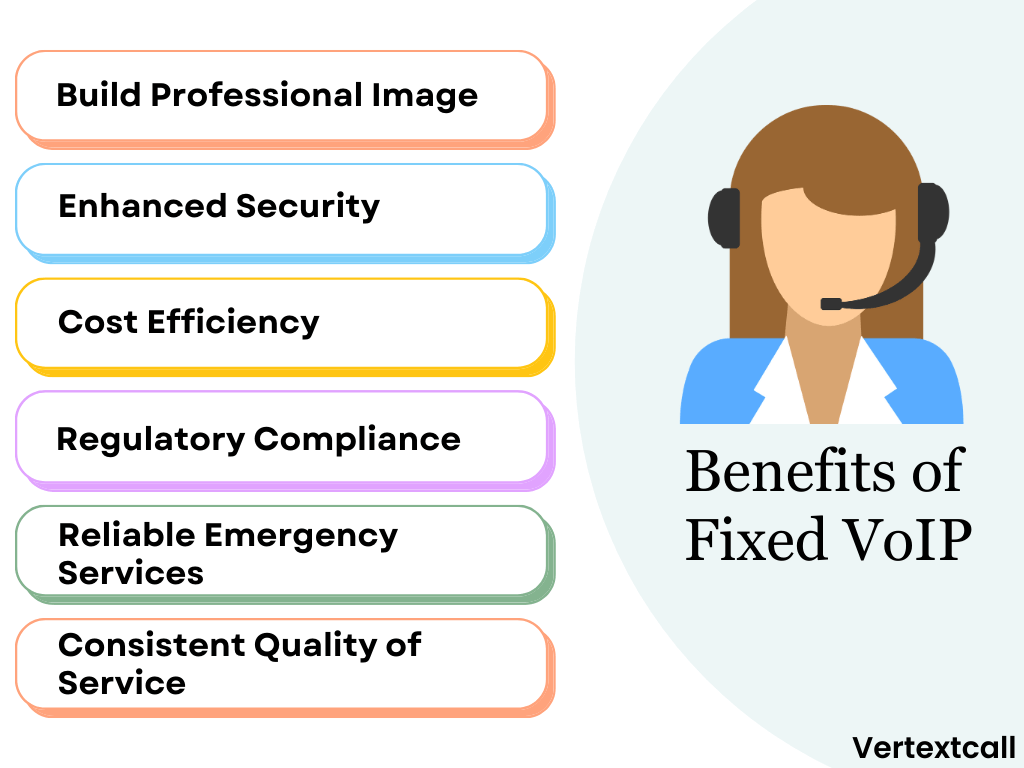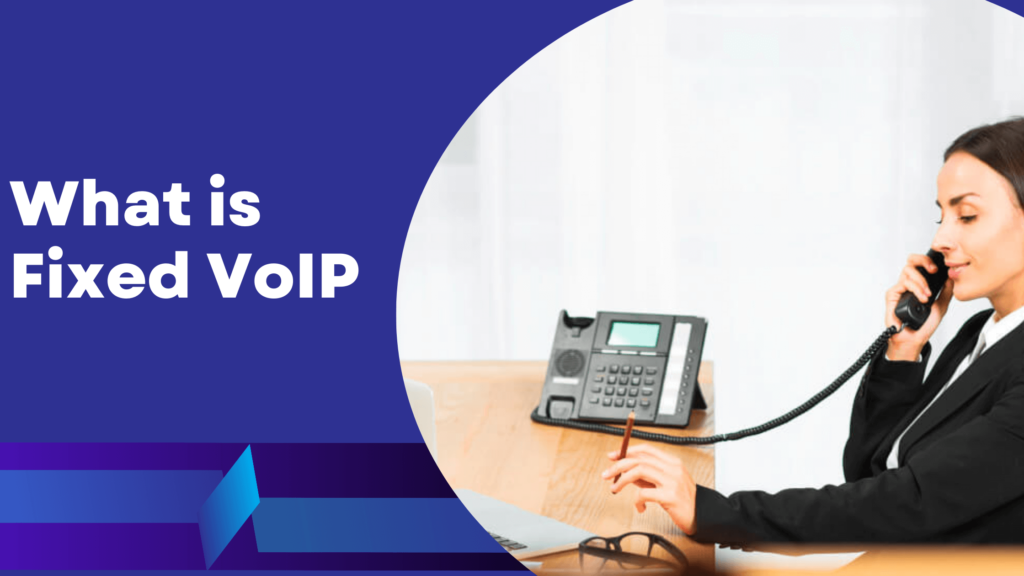Businesses are increasingly turning to Internet-based telephone systems, especially Voice over Internet Protocol (VoIP) services, representing a significant transformation in the way business communications are conducted.
Research shows the VoIP market to experience a growth rate of 10% CAGR from 2023 to 2032. This indicates a shift towards communication solutions that are not only superior in quality but also more cost-effective.
This guide will help you understand in detail what Fixed VoIP numbers are, exploring their advantages, features, types, and what to consider when choosing a provider.
So whether you’re a small business owner or manage a large corporation, understanding Fixed VoIP can significantly enhance your company’s communication efficiency and cut down on costs.
What is Fixed VoIP
A Fixed VoIP number, is an internet-based telephony service attached to a specific geographic location. Unlike Non-Fixed VoIP, which allows you to make calls from anywhere with internet access, your Fixed VoIP number is linked to a designated address.
This connection ensures you have a more stable and secure line. The direct association with a physical location enhances your call quality and reliability and is crucial for emergency services to track your location precisely.
Fixed VoIP is the preferred choice for many businesses due to its durability and integration with current telecommunications systems.
How Fixed VoIP works: A technical overview
Fixed Voice over Internet Protocol (VoIP) works by transforming analog voice communications into digital data that is transmitted via the Internet.

Essentially, you’ll need a VoIP-enabled device, like a phone or a computer with VoIP software, and a connection to a VoIP service provider via a high-speed internet link.
When you make a call using a Fixed VoIP number, your digital voice data travels across the internet to reach your intended recipient efficiently.
The term “fixed” means that your call comes from a specific, identifiable geographic location, which significantly enhances security by enabling accurate location tracking and ensuring higher-quality service.
You’ll notice the superior quality of Fixed VoIP calls because Internet Service Providers (ISPs) give this network traffic priority, reducing latency and ensuring clear, reliable communication.
Moreover, Fixed VoIP requires that you register using physical addresses with your service provider, adding a layer of credibility and reliability, making it especially suitable for business applications.
This secure and verified connection allows for easy integration with existing telecommunication infrastructures, including traditional PSTN (Public Switched Telephone Network) lines, through VoIP gateways.
Related Reading: PSTN and VoIP difference
Key features of Fixed VoIP
Fixed VoIP systems offer a range of features that significantly enhance business communication capabilities. Some of the key features include:

1/ Caller ID Functionality:
The Caller ID feature in Fixed VoIP uses the system’s stability and security to enhance your user experience. When you make a call from a Fixed VoIP number, the person you’re calling sees important details like your phone number and often your name. This feature benefits from being linked to a physical address, which adds credibility and trust to the information displayed.
2/ Call Forwarding:
The call-forwarding feature significantly enhances communication flexibility and efficiency. This functionality allows incoming calls to be redirected from your Fixed VoIP number to any other phone number—be it mobile, landline, or another VoIP number—of your choice.
Additionally, fixed VoIP’s digital integration makes this feature customizable and easy to use. You can also create rules to forward calls based on specific conditions, like busy lines, unanswered calls, or even time of day.
3/ Voicemail:
Using Voicemail in your Fixed VoIP setup allows calls that are not picked up to be redirected to your digital mailbox, where messages can be recorded. This feature offers enhanced quality and clarity in message recording and playback.
Additionally, Voicemail can be integrated with your communication system, allowing for easy management and recovery of messages, thereby ensuring that you stay connected with your clientele, colleagues, and partners, even when direct communication isn’t possible.
4/ Enhance 911 Services:
When you use a Fixed VoIP number to dial emergency services, the E911 feature ensures that your call is not only routed to the nearest emergency service center but also automatically provides the operator with your precise geographic location.
This is possible because your Fixed VoIP numbers are essentially linked to physical addresses. Providing detailed location information greatly improves upon traditional emergency service calls, enabling a quicker and more effective response in emergencies.
5/ Auto Attendant:
The Auto Attendant feature acts as your digital receptionist, streamlining your call management processes and enhancing the professionalism of your communications. When callers reach your business, the Auto Attendant greets them with a pre-recorded message, offering options such as dial-by-name directories or routing calls to specific departments.
This not only enhances your company’s image but also ensures that calls are handled efficiently, directing callers to the appropriate person or information without delay.
Setting up the Auto Attendant in your Fixed VoIP system is simple and flexible, allowing you to customize greetings and menus to match your brand and meet your needs.
6/ Call Queuing:
Call Queuing is a crucial feature designed to enhance your ability to manage calls effectively. This advanced feature systematically organizes incoming calls, prioritizing them or answering in the order received. Fixed VoIP’s digital foundation offers exceptional customization and scalability, allowing your business to handle high call volumes with ease.
With Call Queuing, customers benefit from shorter wait times and superior service quality, as calls are efficiently allocated among team members. This is especially valuable during peak calling periods, helping to avoid congestion and improve customer satisfaction.
Adjustable call queue features, including wait times, hold music, and announcements, enhance the caller’s experience by making it more engaging and informative.
7/ Conference Calling:
This feature lets you and multiple parties participate in the same call, no matter where you are. It enables your team meetings, client consultations, and real-time problem-solving sessions without needing to be in the same room.
Fixed VoIP’s digital architecture supports high-quality audio conferencing, ensuring clear communication among all participants. Moreover, integrating this feature into your VoIP system is simple, offering scalability to support your changing group sizes – from small teams to large, multi-departmental meetings.
Benefits of Fixed VoIP
Here are some of the primary reasons for using a fixed VoIP number for your business communication:

1/ Build Professional Image:
Using a Fixed VoIP system helps your business look more serious and established. When customers see your number, they know exactly where you are and trust you more because your business seems more stable and real. This is important because how customers view your business can affect whether they decide to work with you or not.
2/ Enhanced Security:
Fixed VoIP lines significantly enhance the security of your business communications. Utilizing Fixed VoIP enhances control over both incoming and outgoing calls, significantly reducing the risk of fraud.
Moreover, the traceability feature of fixed lines ensures a more secure communication environment for your business. This VoIP system enables you to focus on your core operations without worrying about unauthorized interception of your conversations.
3/ Regulatory Compliance:
By choosing Fixed VoIP, you align your business with the regulatory frameworks governing communication standards.
This alignment helps you avoid potential legal complications and enhances your enterprise’s credibility by ensuring your operations comply with industry norms and legal requirements.
4/ Reliable Emergency Services:
As discussed above in the features section, in emergencies, Fixed VoIP’s direct association with a physical location enables emergency services to quickly identify your location and provide the necessary assistance without delay.
5/ Consistent Quality of Service:
Using Fixed VoIP means you can expect the same high-quality call experience every time. Unlike varying internet-based call systems, Fixed VoIP connects through dedicated lines. This ensures that voice and video calls are always clear, with minimal disruptions or delays.
6/ Cost Efficiency:
Choosing Fixed VoIP can help your business save money in the long run. By using this system, you avoid the high costs that traditionally come with regular phone lines. Fixed VoIP offers lower rates for calls, especially when you need to call long distances or internationally.
Plus, with fixed VoIP, you often experience additional features without paying extra, unlike traditional phone services that charge for each added function.
Related Reading: VoIP vs Landline pros and cons
Types of numbers used in Fixed VoIP services
Fixed VoIP services offer a variety of number types including Local Numbers, International Numbers, Non-Geographic Numbers, and Mobile VoIP Numbers to meet the unique needs of different businesses.
1/ Local Numbers:
Local numbers in Fixed VoIP services are essentially phone numbers that are specific to a certain geographical area or city. These numbers allow businesses to establish a local presence, even if they are operating remotely or from a different location.
For Example:
If you’re dialing Los Angeles, your US phone number country code format will be as follows: 01213 333 3333
By using local numbers, your company can offer its customers a more personalized and regionally familiar mode of communication, which can significantly enhance trust and connection.
2/ International Numbers:
International numbers provided by Fixed VoIP services allow you to have phone numbers that appear to be based in countries different from where your company is located.
This feature is incredibly useful for you if you’re looking to expand your reach globally without establishing a physical office in those countries. It lets your customers from overseas easily contact your business, as they dial a local number that connects to your VoIP system, often at a lower cost.
3/ Non-Geographic Numbers:
Non-geographic numbers do not connect your business phone line to a specific location. In other words, these are telephone numbers that aren’t linked to a particular area within a country.
For businesses using Fixed VoIP services, non-geographic numbers offer a unique advantage. They allow your company to have one unified number that customers across the country can call without worrying about area codes or long-distance charges.
4/ Mobile VoIP Numbers:
Essentially, these numbers allow you to use your mobile device as part of your business’s phone system. It doesn’t matter where you are; as long as you have internet access, you can make and receive calls just like you would from your office.
Applications of Fixed VoIP
Here are the key applications of Fixed VoIP in two diverse domains:
I. Customer Service and Support Centers:
Fixed VoIP technology has been beneficial for customer service and support centers. Essentially, it allows you to manage calls more efficiently and provide better help to people who contact you.
With Fixed VoIP, your customer service teams can use special features like call forwarding, holding, and transferring without needing complex traditional phone systems. This means you can help customers quickly and more effectively.
Related Reading: Call center VoIP solutions
II. Integration with Smart Home Systems:
Fixed VoIP technology also plays a significant role in the way we connect our homes to our work environment. In simpler terms, it means you can make your home phone system smarter and more connected to your business needs.
With Fixed VoIP, you can answer business calls from your home phone or even direct office calls to your smartphone. This is particularly useful if you’re working from home and need to stay in sync with your office communications.
Related Reading: How VoIP phone solutions promote remote work
What is the difference between fixed and non-fixed VoIP
For businesses understanding the difference between Fixed VoIP and Non-Fixed VoIP services is vital for strategizing their telecommunications approach. Here are four key differences:
1/ Location Dependency:
Fixed VoIP numbers are linked to a physical location, whereas Non-Fixed VoIP numbers are not. This means that calls made through Fixed VoIP can be traced to a specific address, offering added security and reliability for business communications.
Non-Fixed VoIP numbers, however, are more flexible because they can be used from anywhere there is internet. This makes them perfect for people who work remotely or for businesses that do not have one main office.
2/ Regulatory and Security Considerations:
Due to the association with a physical address, Fixed VoIP services are often subject to more strict regulatory requirements and are generally considered more secure.
Non-Fixed VoIP, lacking this physical association, might offer less in terms of security measures and is subject to different regulatory policies, which can vary significantly.
3/ E911 Services:
Fixed VoIP numbers support Enhanced 911 (E911) services, enabling emergency responders to locate callers quickly because these numbers are associated with a physical location.
Non-Fixed VoIP numbers do not offer this feature due to their lack of a specific location, which can affect emergency service response times.
4/ Reliability and Call Quality:
Fixed VoIP provides stable and high-quality communication since it’s connected to a specific location. This stability helps reduce call drops and improves voice clarity.
Non-Fixed VoIP, on the other hand, might experience variations in call quality due to its reliance on varying internet connections across different locations.
To know more check out our detailed guide on: Fixed vs Non fixed VoIP
How to get a fixed VoIP number
Here are the steps involved in securing a Fixed VoIP number:
1/ Assess Business Needs: Before choosing a Fixed VoIP provider, evaluate your business’s communication needs. Consider the number of employees, the need for international calls, and desired features like call forwarding and voicemail.
2/ Choose a Reputable Provider: Research and choose a VoIP service provider that offers Fixed VoIP and meets your business requirements. Go for a provider with reliable support, and services that suit your business size and needs.
3/ Select Area Codes: Fixed VoIP lets you choose area codes that match your business location or your target market. This is important for local branding and customer perception.
4/ Set Up Your System: After selecting your provider and area codes, set up your Fixed VoIP system. This usually involves configuring your VoIP equipment and software. Your provider should help with setup.
5/ Moving Old Numbers: If you already have phone numbers for your business, you can switch them to your new Fixed VoIP system. This is called “porting” It means you don’t have to get new numbers, and you can keep using the ones you already have. Your VoIP service provider will guide you through this process to make sure everything transitions smoothly.
6/ Test Your VoIP Number: Test inbound and outbound calls for clarity and stability before using your new Fixed VoIP number in business operations. Use this time to get familiar with any extra features.
7/ Implement and Monitor: Implement your new Fixed VoIP number in daily operations. Monitor performance and user feedback to optimize use and improve where necessary.
By following these steps, businesses can efficiently acquire a Fixed VoIP number, enhancing their communication capabilities, and aligning with modern telecommunication standards.
Choosing a Fixed VoIP Provider
When transitioning from traditional Public Switched Telephone Network (PSTN) services to a Fixed Voice over Internet Protocol (VoIP) system, several critical factors must be taken into account to ensure that the chosen solution aligns with your business needs
- Network Uptime: It’s important to choose a VoIP provider that ensures their service will be available and working well most of the time. This means ensuring that calls can be made and received without interruptions.
- Data Encryption: Choose a service that keeps your calls safe by turning them into a code that only intended receivers can understand. This helps protect your business’s conversations from being listened to by others.
- Transparent Pricing: Look for a VoIP service that is upfront about how much their service will cost you. This includes the price for making calls, monthly fees, and any additional charges for special features.
- Total Cost of Ownership (TCO): Consider not only the monthly subscription costs but also the expense of any required hardware, setup fees, and potential savings over traditional PSTN services.
- Availability: When picking a VoIP provider, it’s key to select one that offers help whenever you need it. This means they have a team ready to answer your questions or solve issues beyond business hours.
- Quality of Support: Assess the quality of the provider’s customer support through reviews or testimonials. Effective support can significantly impact your experience, especially during the setup phase or in solving technical problems.
Frequently Asked Questions
Q1) Why would someone use a Fixed VoIP?
Ans: Businesses and individuals choose Fixed VoIP for several compelling reasons. Primarily, it offers a more stable and reliable form of communication compared to traditional phone lines or mobile networks, particularly because it’s connected to a physical address. Additionally, Fixed VoIP generally comes with lower operational costs, as it uses the Internet for calls instead of conventional telecom infrastructures. You can also benefit from advanced features like call forwarding, voicemail to email, and conference calls, which may not be easily available or cost-effective with traditional phone services.
Q2) Can you call back a Fixed VoIP number?
Ans: Yes, you can call back a Fixed VoIP number just like any traditional phone number. Fixed VoIP numbers function similarly to regular phone numbers, allowing for both making and receiving calls. This means if you receive a call from a Fixed VoIP number, you can return the call using your phone, regardless of whether you are using a traditional landline, mobile phone, or another VoIP service.
Q3) Is Fixed VoIP a landline?
Ans: No, Fixed VoIP is not a landline in the traditional sense. While both Fixed VoIP and landlines link to a physical location, Fixed VoIP uses the internet to make and receive phone calls, unlike landlines that rely on the copper wire infrastructure of the Public Switched Telephone Network (PSTN). This means Fixed VoIP can offer more flexibility and features compared to standard landline services, such as enhanced call quality, scalability, and integrated communication tools.
Q4) What does a non-fixed VoIP mean?
Ans: A Non-Fixed VoIP is a type of service that allows you to make and receive calls using the internet, but without requiring a specific address for the connection. Non-Fixed VoIP numbers are often used by individuals who need flexibility, as they can be accessed from anywhere with an internet connection. This makes it especially appealing for remote workers, travelers, and online businesses.
Q5) What is a fixed-line telephone number?
Ans: A fixed-line telephone number is associated with a specific line that connects to the Public Switched Telephone Network (PSTN) through physical wires. This type of number points to a singular, permanent address, such as a home or office, making it stable and dependable for both making and receiving calls.
Q6) What is a fixed-line number?
Ans: A fixed-line number refers to a phone number that’s linked to a specific location via a line that physically connects to the public telephone network. This means the number is linked to a place, like a house or business, and not to a mobile device or a digital service. Fixed-line numbers are reliable for making and receiving calls due to their stable connection.

